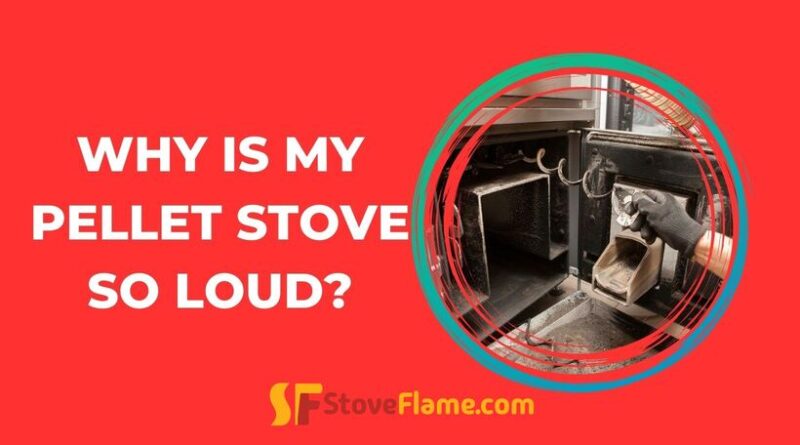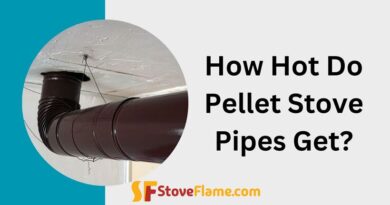Why Is My Pellet Stove So Loud?
Pellet stoves have become a popular alternative heating source for many homeowners, offering an efficient and eco-friendly way to keep their homes warm. However, as with any appliance, there can be issues that arise, one of which is excessive noise. It can be frustrating and concerning when your pellet stove starts making loud noises, disrupting the peace and quiet of your home.
This can be especially alarming for those who have recently invested in a pellet stove, expecting a quiet and smooth heating experience. So why is your pellet stove making such loud noises?
In this blog article, we will explore the various reasons behind a noisy pellet stove and provide solutions to help you enjoy a more peaceful and comfortable heating experience. From examining the inner workings of a pellet stove to troubleshooting common issues, we will delve into the root causes of a noisy pellet stove and offer expert advice on how to address them. So, if you are wondering, “Why is my pellet stove so loud?”, read on to find out.
What Exactly Is a Pellet Stove?
A pellet stove is a type of home heating appliance that uses compressed wood or biomass pellets as fuel. It operates by burning these pellets in a combustion chamber, which produces heat that is then distributed throughout the room or house via a blower fan.
Pellet stoves are known for their efficiency and convenience, as they offer a more eco-friendly alternative to traditional wood-burning stoves or electric heaters. They are also programmable, allowing you to set specific temperatures and timers for automatic operation. With their advanced technology, pellet stoves provide a cost-effective and sustainable heating solution for many homeowners.
How Do Pellet Stoves Work?
Pellet stoves work by utilizing a few key components to efficiently heat your home. The first step is the fuel delivery system, where the compressed wood pellets are automatically fed into the combustion chamber. These pellets are ignited by an electric igniter or a hot surface igniter, creating a controlled flame. The combustion process generates heat, and this heat is transferred to the surrounding air by a heat exchanger.
The blower fan then circulates the heated air throughout your home, ensuring even distribution and maximizing the stove’s efficiency.
Many pellet stoves also have thermostats that allow you to control the temperature settings, giving you precise control over your comfort. Overall, pellet stoves offer a reliable, eco-friendly, and efficient way to heat your home during the colder months.
Why Is My Pellet Stove So Loud?
If you’ve noticed that your pellet stove is making an unusual amount of noise, there are a few possible reasons behind it. One common culprit is a dirty or malfunctioning blower fan. Over time, dust and debris can accumulate on the fan blades, causing it to become unbalanced and produce excessive noise.
Additionally, a loose or worn-out fan belt can also contribute to a noisy operation. Another potential cause of the noise could be an issue with the auger motor. The auger motor is responsible for feeding the pellets into the combustion chamber, and if it is not functioning properly, it can create a loud grinding or rattling noise.
Lastly, it’s worth checking for any obstructions or blockages in the venting system, as this can sometimes cause unusual noises.
If you’re unsure about troubleshooting these issues on your own, it’s always best to consult a professional technician who can diagnose the problem and provide the necessary repairs or adjustments.
By addressing the source of the noise, you can ensure that your pellet stove operates quietly and efficiently, keeping your home warm and comfortable.
Identifying Common Noises: What Sounds Should I Expect?
When it comes to owning a pellet stove, it’s important to be aware of the common noises you might expect to hear. While some level of noise is normal, excessive or unusual sounds may indicate a problem.
Firstly, a gentle humming or whirring sound is typically produced by the blower fan as it circulates warm air throughout the room. Additionally, you may hear a soft clicking or popping noise as the pellets are fed into the combustion chamber by the auger.
However, if you start hearing screeching, grinding, or banging noises, it could indicate issues with the fan, motor, or other components. It’s always a good idea to familiarize yourself with the regular sounds of your pellet stove, so you can quickly identify and address any unusual noises that may arise.
Factors Affecting Pellet Stove Noise Levels
To understand the factors that can affect the noise levels of a pellet stove, it’s important to consider a few key elements. The quality and condition of the components within the stove can have a significant impact on noise levels. For example, worn-out or damaged fan blades can create excess noise as they spin.
Additionally, the design and construction of the stove itself can contribute to noise levels. Stoves with poor insulation or improper sealing may allow sound to escape, resulting in a louder operation.
Furthermore, the type and quality of the pellets used can also play a role. Higher-quality pellets tend to produce less noise when burning compared to lower-quality alternatives.
By considering these factors and ensuring regular maintenance and proper pellet selection, it is possible to minimize the noise levels of a pellet stove and enjoy a quieter and more comfortable heating experience.
How Loud Is Too Loud?
When it comes to deciphering acceptable noise levels for any device or appliance, including pellet stoves, it’s essential to consider the impact on your comfort and well-being.
While some noise is expected with any machinery, excessively loud noise can be disruptive and potentially harmful.
The World Health Organization recommends that indoor noise levels should not exceed 35 decibels during the day and 30 decibels at night for optimal health and sleep quality.
To determine if your pellet stove is too loud, you can use a sound meter to measure the noise levels and compare them to these guidelines. Additionally, pay attention to your personal comfort level; if the noise is interfering with your daily activities or causing excessive stress, it may be worth investigating and addressing the issue.
Remember that regular maintenance and ensuring proper insulation and sealing can help to reduce noise levels and create a more peaceful environment in your home.
Troubleshooting: Why Is My Pellet Stove Suddenly Noisy?
One possible reason for your pellet stove suddenly becoming noisy could be a problem with the fan or blower motor. Over time, these components can wear out or accumulate debris, leading to increased noise during operation.
To troubleshoot this issue, start by inspecting the fan and motor for any signs of damage or obstruction. Clean them carefully, removing any dirt or debris that may have built up. If the noise persists, it might be necessary to replace the fan or motor to restore quieter operation.
Tips for Quieting Your Pellet Stove
Regular maintenance is key to keeping your pellet stove running smoothly and quietly. One important maintenance task is cleaning the stove’s exhaust vent and chimney. Over time, creosote and debris can build up, causing airflow restrictions and potentially leading to increased noise. Schedule regular inspections and cleanings to ensure proper ventilation.
Additionally, check and clean the stove’s burn pot and heat exchanger regularly to prevent clogs and improve efficiency. Lubricating moving parts, such as the auger and fan motor, can also help reduce noise caused by friction. By staying on top of these maintenance tasks, you can enjoy a quieter and more efficient pellet stove.
Can Newer Models Reduce Noise?
When considering upgrading your pellet stove, one potential benefit to look out for is reduced noise. Newer models often come equipped with advanced features and technology designed to minimize operational noise. These can include improved insulation, quieter fans, and enhanced combustion systems.
\Additionally, some manufacturers specifically mention noise reduction as a key feature of their newer models. Before making a purchase, be sure to research and compare different pellet stove brands and models to find one that prioritizes quiet operation. Upgrading to a newer, quieter pellet stove can provide a more comfortable and peaceful heating experience in your home.
When Should I Call a Technician?
If despite your efforts to reduce noise, your pellet stove continues to be excessively loud, it may be time to seek professional help from a technician. While some level of noise is to be expected during operation, loud and persistent noises could be indicative of underlying issues that require professional attention.
If you notice unusual banging or clanging sounds, grinding or squealing noises, or if the noise suddenly becomes louder than usual, it is advisable to call a technician. They have the expertise to diagnose and resolve any mechanical issues that may be causing the excessive noise.
Additionally, a technician can also conduct regular maintenance and cleaning to ensure the optimal performance and longevity of your pellet stove. Don’t hesitate to reach out to a professional if you are concerned about the noise level of your pellet stove.
Conclude
In conclusion, if you are experiencing a loud and disruptive noise from your pellet stove, there are several potential causes that can be easily addressed. By following the steps outlined in this post, you can troubleshoot and fix the issue, ensuring that your pellet stove operates quietly and efficiently.
Don’t hesitate to consult a professional if needed, but with a little effort and maintenance, your pellet stove can provide a warm and peaceful atmosphere in your home.
I'm Daniel Miller, the proud owner of StoveFlame. With over five years of experience in this dynamic field, I've honed my skills and passion for delivering top-notch quality and accuracy in everything I do.





